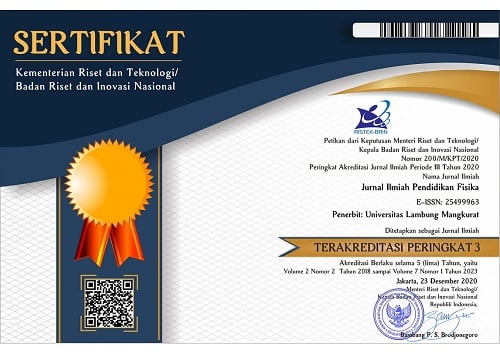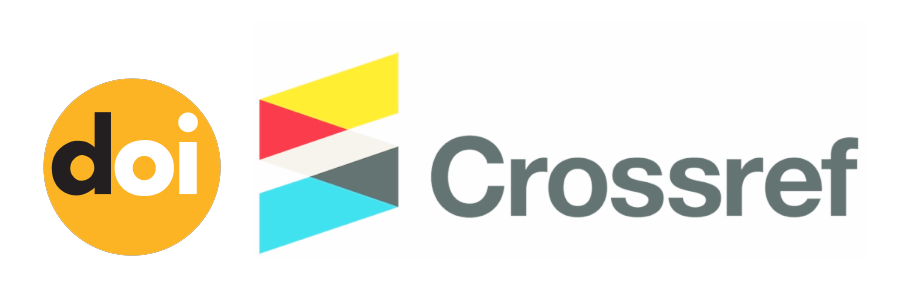Design TPACK Strategy with Modellus Software for Simulation Based on The Guided Inquiry on The Wave Concept
Abstract
Technological Pedagogical and Content Knowledge (TPACK) is a teacher framework in integrating Information and Communication Technology (ICT) in learning. The purpose of the initial learning planning by implementing the guided inquiry-based TPACK strategy is to increase the mastery of concepts and student learning activities. This research uses the literature review method with qualitative predictive analysis. Object research is an information system with the reason that there is a change in the application of information systems that were once still conventional, now began to be computerized and the development of information systems can be on various platforms, Among others, the web, desktop, mobile, and the last reason being that the development of information system systems has a variety of methods. Initial planning of learning using TPACK-based guided inquiry effectively improves students' mastery of concepts. The subjects were transversal and longitudinal waves with Modellus software. In general, this initial design is that learning with guided inquiry-based TPACK strategies increases mastery of concepts and student learning activities.
Keywords
Full Text:
PDFReferences
REFERENCES
Bakri, F., & Muliyati, D. (2018). Design of multiple representations e-learning resources based on a contextual approach for the basic physics course. Journal of Physics: Conference Series, 1013(1), 2–9. https://doi.org/10.1088/1742-6596/1013/1/012037
Billah, A., Rizqia, I., & Susilayati, M. (2020). The scientific cues study of “zarrah” in al-qur’an as knowledge content on modern physics learning based on tpack. ‘Abqari Journal, 23(1), 1-14.
Bulanov, S. V., Pegoraro, F., Pukhov, A. M., & Sakharov, A. S. (1997). Transverse-wake wave breaking. Physical Review Letters, 78(22).
Enferadi, M. H., Ghasemi, M. R., & Shabakhty, N. (2019). Wave-induced vibration control of offshore jacket platforms through SMA dampers. Applied Ocean Research, 90. https://doi.org/10.1016/j.apor.2019.06.005
Fujikubo, M., Kaeding, P., & Yao, T. (2000). Longitudinal and transverse thrust. Journal of the Society of Naval Architects of Japan, 2000(187). https://doi.org/https://doi.org/10.2534/jjasnaoe1968.2000.209
Harris, J., Mishra, P., & Koehler, M. (2009). Teacher’s Tecnological pedagogical content knowledge and learning activity types: Curricullum-based technology integration Reframed. Journal of Educational Computing Research, 32, 329–340.
Ilmi, A. M., Sukarmin, & Sunarno, W. (2020). Development of TPACK based-physics learning media to improve HOTS and scientific attitude. Journal of Physics: Conference Series, 1440(1). https://doi.org/10.1088/1742-6596/1440/1/012049
Jonny, H. P., Rajagukguk, D., & Rajagukguk, J. (2020). Computational Modelling Based on Modellus to Improve Students’ Critical Thinking on Mechanical Energy. Journal of Physics: Conference Series, 1428(1). https://doi.org/10.1088/1742-6596/1428/1/012042
Kanginan, M. (2017). Fisika untuk SMA/MA kelas XI Kurikulum 2013. Erlangga.
Kitchenham, B., Pearl Brereton, O., Budgen, D., Turner, M., Bailey, J., & Linkman, S. (2009). Systematic literature reviews in software engineering - A systematic literature review. Information and Software Technology, 51(1). https://doi.org/https://doi.org/10.1016/j.infsof.2008.09.009
Koehler, M. J., Mishra, P., & Cain, W. (2008). What is technological pedagogical content knowledge (TPACK)? Journal of Education, 193(3), 13–19. https://doi.org/10.1177/002205741319300303
Mansur, H., Mastur, & Utama, A. H. (2020). Evaluasi kemampuan guru melaksanakan pembelajaran k-13 berbasis tpack model countenance evaluation. International Journal of Innovation, Creativity and Change, 14(3).
Mayer, P., & Girwidz, R. (2019). Physics teachers’ acceptance of multimedia applications—adaptation of the technology acceptance model to investigate the influence of tpack on physics teachers’ acceptance behavior of multimedia applications. Frontiers in Education, 4. https://doi.org/https://doi.org/10.3389/feduc.2019.00073
Mishra, L., Gupta, T., & Shree, A. (2020). Online teaching-learning in higher education during lockdown period of covid-19 pandemic. International Journal of Educational Research Open (Journal Pre-Proof).
Oliver, M. (2011). Handbook of technological pedagogical content knowledge (TPCK) for educators.
Putriani, S. (2014). Implementasi strategi tpck dengan media simulasi berbasis inkuiri terbimbing pada konsep getaran dan gelombang. Unnes Physics Education Journal, 3(2). https://doi.org/10.15294/upej.v3i2.3595
Shen, Y., Liu, Y. D., Chen, P. F., & Ichimoto, K. (2014). Simultaneous transverse oscillations of a prominence and a filament and longitudinal oscillation of another filament induced by a single shock wave. Astrophysical Journal, 795(2). https://doi.org/https://doi.org/10.1088/0004-637X/795/2/130
Shulman, L. (1986). Those who understand: Knowledge growth in teachin. Educational Researcher, 15(2), 4–14.
Susanti, L., Darmawan, H., & Boisandi, B. (2019). Penerapan model pembelajaran generatif dengan kerangk kerja tpck terhadap hasil belajar siswa pada materi wujud zat dan perubahannya di kelas vii mts nahdhatul atfhal sungai ambawang. Jurnal Pendidikan Sains Dan Aplikasinya(JPSA), 2(1), 15–15. https://doi.org/Vol. 2, No. 1 (2019), Hal. 11-16
Suyamto, J., Masykuri, M., & Sarwanto, S. (2020). Analisis kemampuan tpack (technolgical, pedagogical, and content, knowledge) guru biologi sma dalam menyusun perangkat pembelajaran materi sistem peredaran darah. INKUIRI: Jurnal Pendidikan IPA, 9(1). https://doi.org/https://doi.org/10.20961/inkuiri.v9i1.41381
Thohir, M. A., & Warsono, W. (2018). Designing optical spreadsheets-technological pedagogical content knowledge simulation (s-tpack): a case study of pre-service teachers course. Turkish Online Journal of Educational Technology - TOJET, 17(1).
Triandini, E., Jayanatha, S., Indrawan, A., Werla Putra, G., & Iswara, B. (2019). Metode systematic literature review untuk identifikasi platform dan metode pengembangan sistem informasi di indonesia. Indonesian Journal of Information Systems, 1(2), 63. https://doi.org/https://doi.org/10.24002/ijis.v1i2.1916
DOI: https://doi.org/10.20527/jipf.v6i1.4086
Refbacks
- There are currently no refbacks.
Indexed by: Jurnal Ilmiah Pendidikan Fisika is licensed under a creative commons attribution-share alike 4.0 international license
Statistics Counter |
















